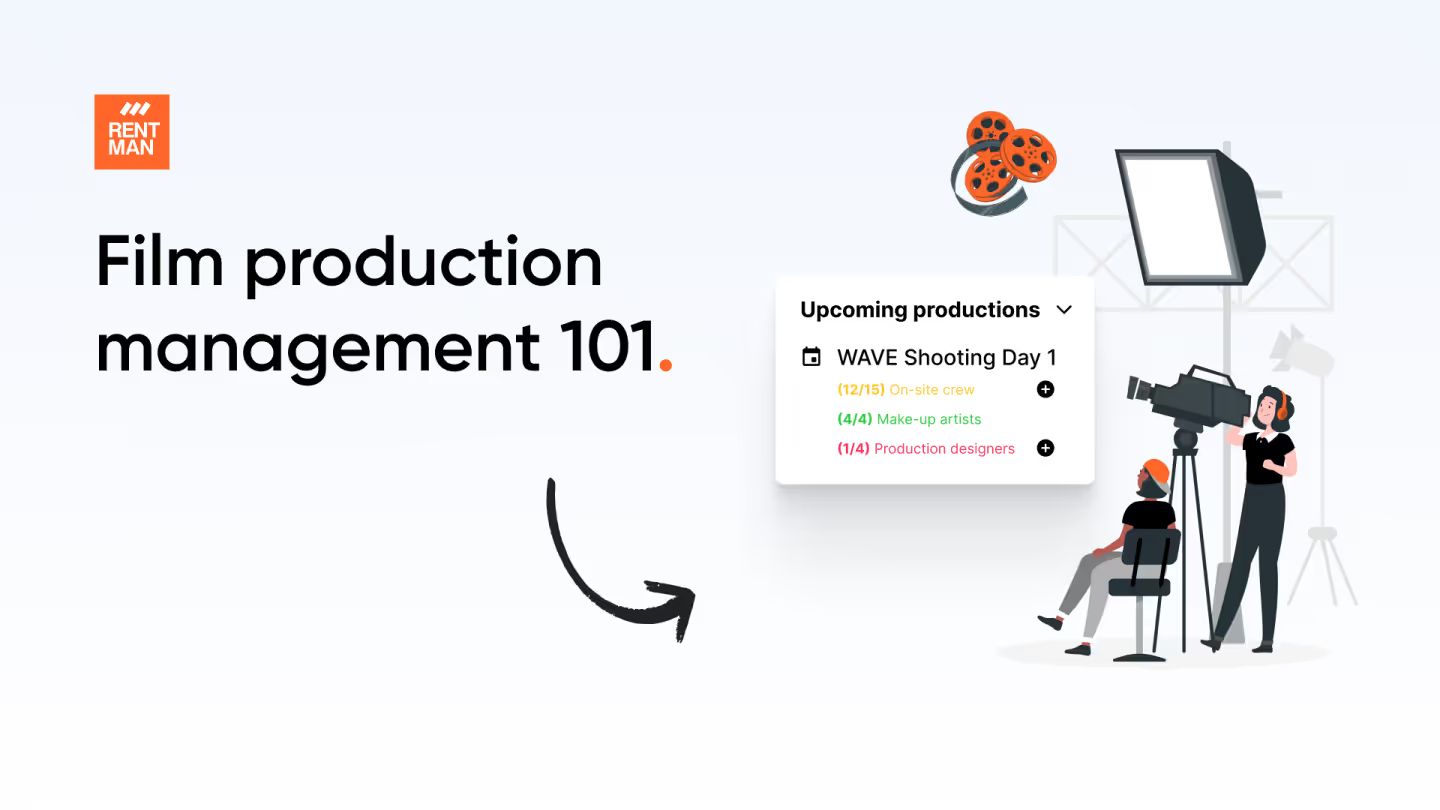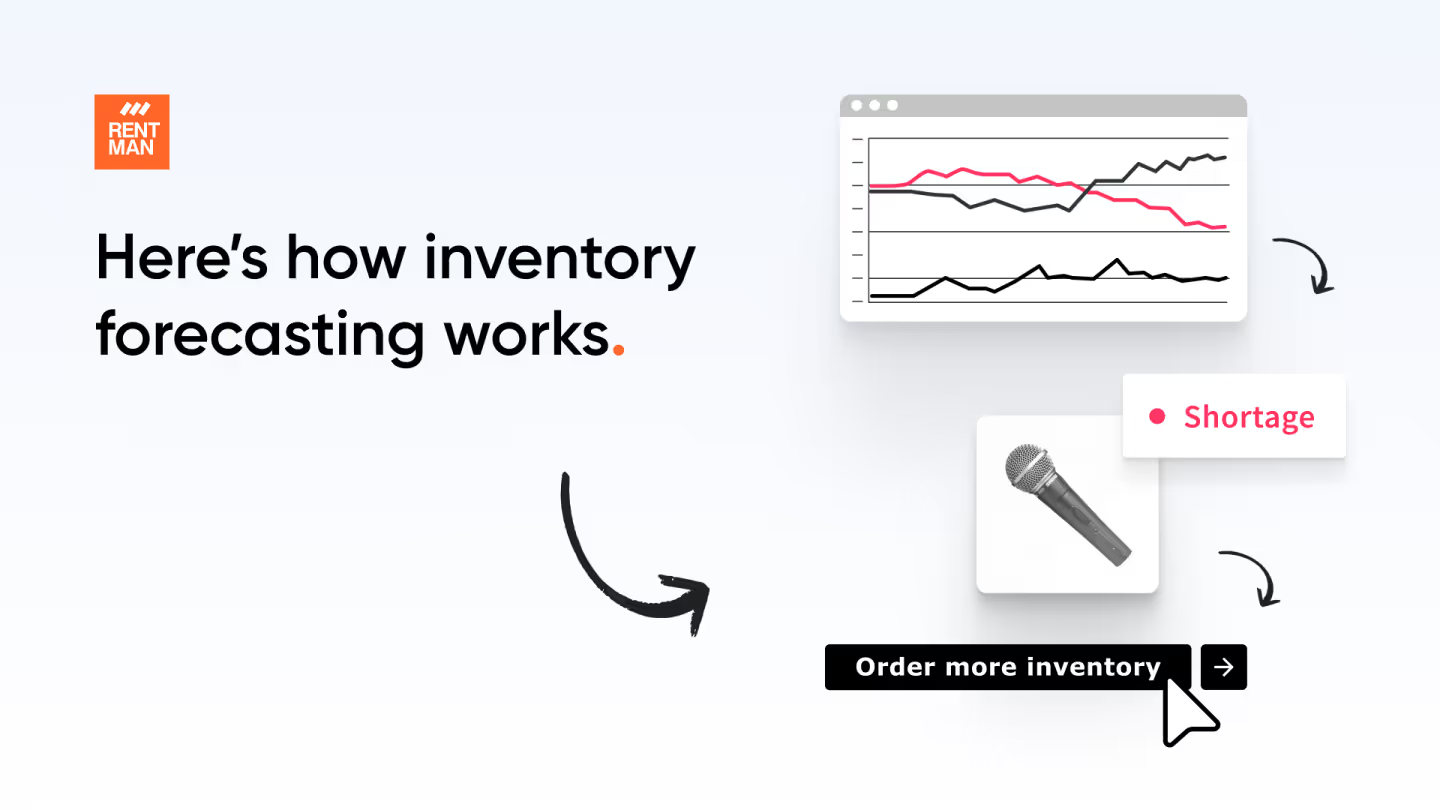Film production management guide

Film production, the captivating process that transforms ideas into a visual spectacle, is balancing creativity and organization. At its core lies film production management, handling every detail from conception to the silver screen. This comprehensive guide takes you through the realms of film production, unravels the complexities of film production management, and equips you with insights to navigate the path of creating a compelling film.
1. Film production unveiled
2. Essence of film production management
3. Meet the film production team
4. Example of a film production schedule
5. Planning a film production
6. Film production budgeting
7. Why you should use film production management software
Film production unveiled
Film production is a process that transforms creative concepts into a visual experience for audiences worldwide. At its core, it is a holistic process encompassing three distinct phases: pre-production, production, and post-production. Each step contributes to the creation of an experience that engages, entertains, and leaves a lasting impact on viewers.
Effective film production management starts with solid planning. If you’re looking for a practical way to organize schedules, crews, and resources, this free video & film production planning template can help streamline your entire pre-production process.
1. Pre-Production
This initial phase lays the groundwork for the entire project. Activities include script development, casting, location scouting, and the creation of a detailed film production plan.
During pre-production, having a clear overview of crew availability, equipment, and timelines is essential — especially in complex setups common across the media and broadcasting industry.
2. Film production
This is the heart of the filmmaking process, where carefully crafted plans are brought to life. This phase includes shooting scenes, capturing actors' performances, and assembling the raw footage that will later be shaped into the final product.
3. Post-Production
This final phase adds the finishing touch to the film production. Editors, sound designers, and visual effects artists collaborate to refine the raw footage into a polished final product. Scenes are sequenced, special effects are added, and soundscapes are crafted to evoke the desired emotional response.
Essence of film production management
Film production management is all about seamlessly combining the components that transform a creative vision into a visual product, and bring a filmmaker's idea to life. At its core, film production management is finding the balance between artistic vision and logistical precision. Let's take a look at the elements of film production management:
1. People management
Central to film production management is the coordination of a diverse team, each member contributing a unique skill set. Producers, directors, cinematographers, and various crew members must work cohesively to translate the screenplay into a visual narrative.
Workforce management is a strategy that helps optimize your crew, ensuring you have the right amount of people with the skills you need for your film production.
2. Resource allocation
From camera equipment to costume design, film production requires an array of resources. Film production managers are tasked with allocating these resources to meet artistic objectives within budgetary constraints. This involves an understanding of industry trends, and the ability to make strategic decisions that enhance the overall quality of the film production.
3. Time management
Time is precious in the film industry. Film production managers meticulously plan schedules, ensuring that every aspect of the film production stays on track. This includes setting realistic timelines for the pre-production, production, and post-production phases. Delays can have cascading effects, impacting budgets and potentially compromising the creative vision.
4. Logistics and planning
From scouting locations to securing permits, film production management involves complicated logistical planning. Managers navigate the complexities of scheduling shoots, coordinating transportation, and handling unforeseen challenges that may arise during production.
Meet the film production team
There is no filmmaking without a film production team. From producers to cinematographers, each member contributes to the film production with their own set of skills. Let's dive into the different roles in a film production team and their responsibilities:
Producers
Producers are the driving force behind a film and are tasked with overseeing the project's development from its initial stages to completion. They conceive the project's vision, shape the screenplay into a viable concept, and secure funding for its realization.
Directors
Directors are the captains of creative direction. They are translating the script into a visual narrative that resonates with audiences. They guide actors and crew and make critical decisions on shot composition, pacing, and overall storytelling.
Cinematographers
Cinematographers are masters in visual storytelling, wielding the camera to capture the mood and atmosphere of a film. Their expertise lies in using lighting, framing, and camera movement to create a visual language that enhances the overall aesthetic and emotional impact of a movie.
Film production designers
Film production designers are charged with creating the look and feel of the sets, they ensure that the visual elements align seamlessly with the director's vision. Their attention to detail extends to every aspect of the set, influencing the overall ambiance and enhancing the audience's immersion in the cinematic world.
Are you a film production company operating in California or working with California-based freelancers? Read everything about California AB5 Gig-worker law in this article.

Example of a film production schedule
Film production requires more than creative vision; it demands a precise temporal blueprint. The film production schedule is the navigational guide from script conception to the unveiling on screen. In this section, we delve into the intricacies of this temporal blueprint, its definition, significance, and the critical phases of film production.
1. Temporal blueprint: decoding the film production schedule
A film production schedule is not merely a timeline; it is the meticulous blueprint that steers the entire filmmaking process. Acting as a temporal guide, the film production schedule orchestrates the complexities of pre-production, production, and post-production, ensuring a synchronized and efficient process from concept to completion.
The significance of this temporal guide lies in its ability to ensure synchronized and efficient filmmaking. It dictates when and how each phase unfolds, facilitating seamless coordination, and ultimately shaping the successful realization of a cinematic vision within budgetary and time constraints.
2. Film production schedule example
As you already know, film production goes through three distinct phases, each laden with unique challenges and nuances essential to the film's success. Let's take a production with a historical theme as a film production schedule example and see what happens in each phase.
Pre-Production schedule example
In the pre-production phase, the groundwork is laid. Every detail is considered — from sourcing period-appropriate costumes to securing historically accurate locations. The team focuses on script development and casting, ensuring that the essence of the chosen era is authentically brought to life. A detailed shooting plan is crafted, a key element to recreate the historical backdrop convincingly.
Film Production schedule example
Capturing a complex action sequence requires careful choreography, coordination, and technical precision. The production team must navigate the intricacies of historical settings, ensuring that the visual impact aligns with the authenticity expected from the genre.
Post-Production schedule example
The final phase involves editing sequences, adding special effects to enhance scenes, and fine-tuning soundscapes to capture the ambiance of different eras. Post-production may include precisely timing music cues and strategic editing to maintain tension, showcasing the transformative power of this concluding phase.
Planning a film production: the key to success
Film production planning is the strategic roadmap that navigates a project from inception to the silver screen. It encompasses a series of critical steps, each demanding attention to detail to ensure a successful production.
1. Script development
The foundation of any film production plan lies in the script. A well-crafted script forms the blueprint for the entire project. The narrative, dialogue, and character arcs set the creative tone, influencing casting choices, visual aesthetics, and overall film production design. Missteps in script development may result in a disjointed narrative, affecting the audience's engagement.
2. Casting
The selection of actors is a pivotal aspect of film production planning. Casting decisions profoundly impact the authenticity and appeal of characters, influencing the audience's connection with the story. A mismatched cast can lead to mediocre performances, undermining the emotional resonance of the film, jeopardizing the narrative's integrity, and hindering the overall success of the film.
3. Location scouting
Choosing the right locations is an art in itself. The visual backdrop sets the stage for the story, and the right locations enhance the film's authenticity. Poor location choices can disrupt the narrative flow, compromise visual aesthetics, and add unnecessary challenges during film production.
4. Equipment preparation
Ensuring that the necessary equipment is in optimal condition is vital. From cameras and lighting to sound recording devices, technical malfunctions can stall film production, leading to delays and additional costs. Thorough equipment checks and contingency plans are essential to prevent such disruptions.
5. Film production budgeting
A comprehensive budget is the financial backbone of film production planning. Accurate film production budgeting ensures that resources are allocated judiciously, preventing overspending and financial strain. Lack of budgetary control can lead to compromises in quality, impacting the overall success of the project.
Film production budgeting
Film production budgeting moves between creativity and fiscal responsibility. Determining where each budget allocation goes involves a careful consideration of various elements:
1. How to allocate your film budget
- Pre-production budget: Allocate funds for script development, casting, location scouting, and other planning activities.
- Production budget: Consider costs related to filming, including crew salaries, equipment rental, permits, and logistics. The bulk of the budget is often allocated to this phase.
- Post-production budget: Budget for editing, sound design, visual effects, and any additional post-production requirements.
- Contingency budget: Always include a contingency fund for unforeseen circumstances. Weather changes, equipment malfunctions, or unexpected delays can impact the budget, and having a contingency ensures flexibility.
2. Why proper film production budgeting is crucial
Film production budgeting is about strategically distributing the budget so that it supports the creative vision. A realistic budget is the cornerstone of a smooth production process, ensuring that creativity thrives within the boundaries of financial sustainability.
Resource allocation
Proper film production budgeting ensures that resources are allocated judiciously, preventing overspending and financial strain. This allows filmmakers to make informed decisions and maintain control over the production's financial health.
Quality assurance
A realistic budget supports the creative vision without compromising on quality. It ensures that the necessary resources, from skilled personnel to cutting-edge equipment, are available to enhance the film's overall production value.
Project viability
Investors and stakeholders often require a clear and detailed budget to assess the project's viability. A well-prepared budget demonstrates financial responsibility and enhances the project's credibility, facilitating funding and collaboration opportunities.
Risk mitigation
Accurate film production budgeting includes a contingency plan, acting as a safety net for unexpected challenges. This proactive approach minimizes the impact of unforeseen circumstances, helping to keep the production on track.
Why you should use film production management software
Film production management software is a game-changer, providing filmmakers with the tools to navigate the intricate web of tasks and responsibilities. From planning to post-production, these digital solutions elevate efficiency, enhance collaboration, and contribute to the overall success of a film.
1. Efficiency enhancements
Film production management software fosters efficiency by centralizing communication, minimizing manual processes, and automating repetitive tasks. It ensures that everyone involved has access to the most up-to-date information, reducing the risk of miscommunication or outdated data.
2. Overall film production management benefits
This technology improves project management by promoting transparency, collaboration, and accountability. It allows stakeholders to monitor progress, manage budgets, and track timelines in real time, fostering a cohesive and well-coordinated film production process.
3. Essential features
A robust film production management software should include features such as task management, budget tracking, scheduling tools, collaboration platforms, and reporting capabilities. Integration with other industry-standard tools and user-friendly interfaces is also crucial for seamless adoption and effective utilization.
Need some help implementing and getting started with new software? Find our tips here.
Conclusion
Film production strongly relies on film production management. The cooperation between the different roles, the temporal blueprint, and meticulous planning shape the cinematic experience. Film production budgeting adds financial precision, ensuring resource alignment.
Enter the technological era with film production management software, streamlining tasks and enhancing collaboration. Elevate your craft—explore the possibilities with Rentman's Media and Broadcasting Management Software. Seamless filmmaking awaits, where creativity meets efficiency.
Frequently asked questions
Frequently asked questions
Film project management is the overarching discipline that oversees the planning, execution, and completion of a film production, ensuring adherence to schedules and budgets.
The project schedule for film production is a comprehensive timeline outlining specific tasks and activities across pre-production, production, and post-production stages.
A film production schedule encompasses crucial tasks like script development, casting, shooting, editing, and other activities vital for completing a film.
The stages of film production consist of pre-production, production, and post-production, each presenting distinct challenges and tasks crucial to the filmmaking process.
Previous blog posts

Reduce the Chaos — Rentman's top tips to solve your most common warehouse challenges
Reduce the Chaos — Rentman's top tips to solve your most common warehouse challenges


